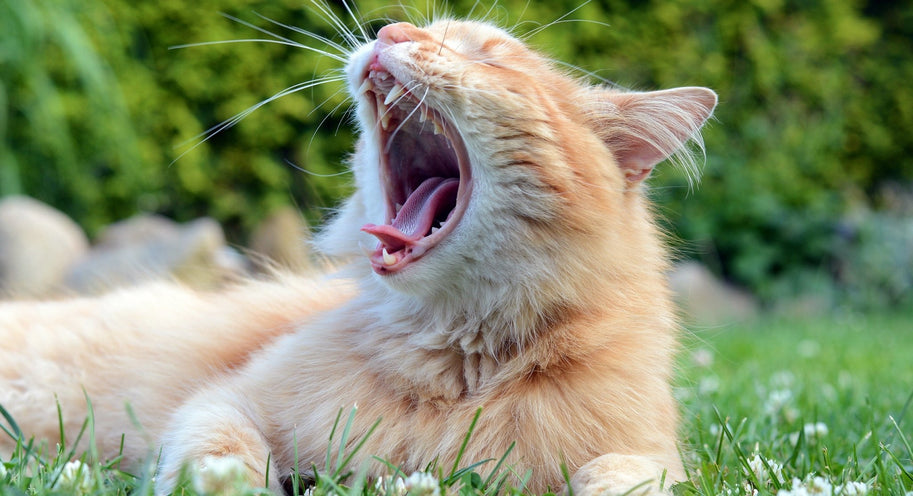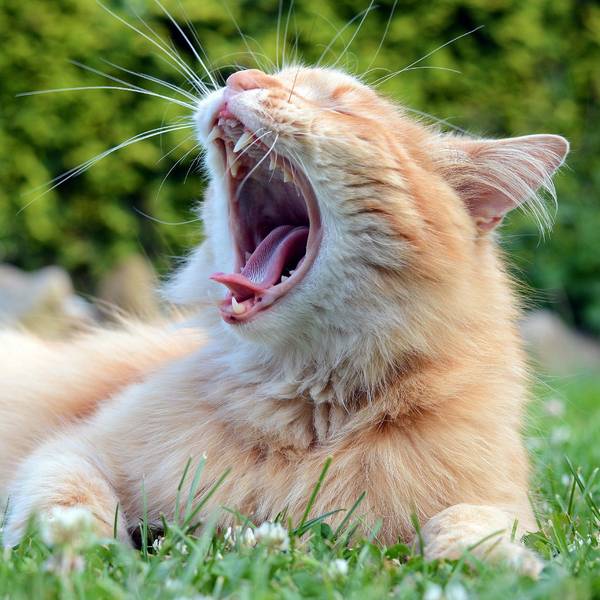Four out of every five dogs and cats over the age of three years have some sort of dental disease which becomes more severe with age.
Untreated dental problems can lead to more serious problems such as illnesses related to the heart, liver and kidney.
Dogs are pack animals and showing weakness is not part of their nature. They need to eat to survive so won't go off their food until the pain is unbearable.
Pets can't brush their teeth, but just like people, dogs and cats are at risk for dental problems that can cause pain and serious health issues. Your pet is counting on you for dental care to stay healthy and happy.
Causes of periodontal disease
Periodontal disease is caused by an accumulation of plaque. Plaque is a colourless film that contains large amounts of potentially harmful bacteria. If left unchecked, built-up plaque can create infection, destroying your pet's gums and the tissue and bone that support the teeth. Preventive oral care can reduce plaque and help maintain proper oral health.
Signs of periodontal disease
- Bad breath
- Yellow-brown crust on teeth
- Red or bleeding gums
- Change in chewing or eating habits
- Tooth loss
- Change in behaviour
- Abnormal drooling
Contributing factors of Poor oral hygiene
Ignoring the condition of your pet's mouth can lead to periodontal disease, tooth loss and other serious health problems. Breed Periodontal disease is more common in smaller breeds of dogs and certain breeds of cats. Age Dental disease is more common as pets get older
Healthy mouth, healthy body
Proper oral care isn't just good for the mouth it's good for the whole body, too. Poor dental health, on the other hand, can put the health of your pet's body organs at risk.
- Plaque builds up on a pet's teeth
- Bacteria in the plaque irritate the pet's gums
- The irritated gums bleed, allowing bacteria from the plaque to enter the bloodstream
- Bacteria in the bloodstream travel throughout the body, and can negatively impact vital organs
Emerging science suggests a strong link between good oral health and heart health. Pets with poorly maintained teeth and gums also run the risk of experiencing several other serious health problems:
- Painful dental infections
- Tooth loss
- A taxed immune system, which limits a pet's ability to fight disease and infection
Home dental care Keeping watch
Home dental care includes monitoring your pet for changes in behaviour and inspecting your pet's mouth regularly.
Tooth brushing
You may find it difficult to imagine brushing your pet's teeth, but daily brushing is the very best way to help your pet avoid dental disease.
Tips on brushing your pet's teeth
- Introduce a brushing program gradually and early; training may take several days or weeks.
- At first, dip your finger into beef bouillon for a dog or tuna water for a cat, and rub your finger over the pet's mouth and teeth.
- Make these initial sessions brief and positive.
- Introduce gauze on your finger with the same beef or tuna flavor and begin rubbing the teeth in a circular motion.
- Before graduating to a soft-bristle toothbrush, put a small amount of toothpaste specifically designed for pets on your finger and allow the pet to taste it.
- Finally, apply a small dab of pet toothpaste on a moist toothbrush and allow your pet to lick the bristles. Begin brushing gently at a 45 degree angle away from the gum line.
- Please note: toothpaste designed for people contains ingredients that may upset your pet's stomach.
Did you know? Dental disease doesn't just affect the mouth
There are several ways it can interfere with your pet's overall health and quality of life.
Dental disease can lead to problems in the heart, liver, kidneys or other organs.
Plaque is a colorless film containing large amounts of bacteria that builds up on your pet's teeth. Plaque can cause infection, destroying gums, bone and other tissues that support the teeth. Your pet's mouth may develop small wounds that allow the bacteria to enter the bloodstream and spread throughout the body.
Do you know what it means when your pet picks up a kibble and then drops it?
Some pets play with their food and may drop it while eating. Other pets with dental disease drop food because they find it difficult or painful to chew
Don't risk dental disease, tooth loss and other serious health problems by ignoring your pet's mouth. Speak to your local Just For Pets retailer about a FREE dental check-up.






